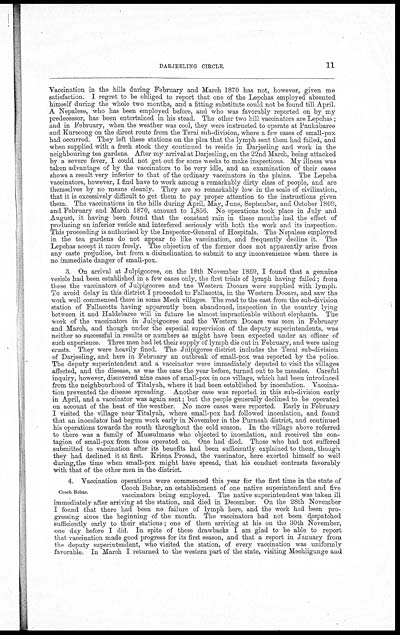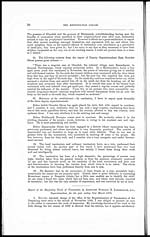Medicine - Vaccination > 1869-1873 - Report on vaccination in the Province of Bengal > Report on vaccination proceedings under the Government of Bengal with an appendix for the year ending 31st March 1870
(111) Page 11
Download files
Individual page:
Thumbnail gallery: Grid view | List view

DARJEELING CIRCLE. 11
Vaccination in the hills during February and March 1870 has not, however, given me
satisfaction. I regret to be obliged to report that one of the Lepchas employed absented
himself during the whole two months, and a fitting substitute could not be found till April.
A Nepalese, who has been employed before, and who was favorably reported on by my
predecessor, has been entertained in his stead. The other two hill vaccinators are Lepchas;
and in February, when the weather was cool, they were instructed to operate at Pankabaree
and Kurseong on the direct route from the Terai sub-division, where a few cases of small-pox
had occurred. They left these stations on the plea that the lymph sent them had failed, and
when supplied with a fresh stock they continued to reside in Darjeeling and work in the
neighbouring tea gardens. After my arrival at Darjeeling, on the 22nd March, being attacked
by a severe fever, I could not get out for some weeks to make inspections. My illness was
taken advantage of by the vaccinators to be very idle, and an examination of their cases
shows a result very inferior to that of the ordinary vaccinators in the plains. The Lepcha
vaccinators, however, I find have to work among a remarkably dirty class of people, and are
themselves by no means cleanly. They are so remarkably low in the scale of civilization,
that it is excessively difficult to get them to pay proper attention to the instructions given
them. The vaccinations in the hills during April, May, June, September, and October 1869,
and February and March 1870, amount to 1,856. No operations took place in July and
August, it having been found that the constant rain in these months had the effect of
producing an inferior vesicle and interfered seriously with both the work and its inspection.
This proceeding is authorised by the Inspector-General of Hospitals. The Nepalese employed
in the tea gardens do not appear to like vaccination, and frequently decline it. The
Lepchas accept it more freely. The objection of the former does not apparently arise from
any caste prejudice, but from a disinclination to submit to any inconvenience when there is
no immediate danger of small-pox.
3. On arrival at Julpigooree, on the 18th November 1869, I found that a genuine
vesicle had been established in a few cases only, the first trials of lymph having failed; from
these the vaccinators of Julpigooree and the Western Dooars were supplied with lymph.
To avoid delay in this district I proceeded to Fallacotta, in the "Western Dooars, and saw the
work well commenced there in some Mech villages. The road to the east from the sub-division
station of Fallacotta having apparently been abandoned, inspection in the country lying
between it and Haldebaree will in future be almost impracticable without elephants. The
work of the vaccinators in Julpigooree and the Western Dooars was seen in February
and March, and though under the especial supervision of the deputy superintendents, was
neither so successful in results or numbers as might have been expected under an officer of
such experience. Three men had let their supply of lymph die out in February, and were using
crusts. They were heavily fined. The Julpigoree district includes the Terai sub-division
of Darjeeling, and here in February an outbreak of small-pox was reported by the police.
The deputy superintendent and a vaccinator were immediately deputed to visit the villages
affected, and the disease, as was the case the year before, turned out to be measles. Careful
inquiry, however, discovered nine cases of small-pox in one village, which had been introduced
from the neighbourhood of Titalyah, where it had been established by inoculation. Vaccina-
tion prevented the disease spreading. Another case was reported in this sub-division early
in April, and a vaccinator was again sent; but the people generally declined to be operated
on account of the heat of the weather. No more cases were reported. Early in February
I visited the village near Titalyah, where small-pox had followed inoculation, and found
that an inoculator had begun work early in November in the Purneah district, and continued
his operations towards the south throughout the cold season. In the village above referred
to there was a family of Mussulmans who objected to inoculation, and received the con-
tagion of small-pox from those operated on. One had died. Those who had not suffered
submitted to vaccination after its benefits had been sufficiently explained to them, though
they had declined it at first. Krisna Prosad, the vaccinator, here exerted himself so well
during the time when small-pox might have spread, that his conduct contrasts favorably
with that of the other men in the district.
Cooch Behar.
4. Vaccination operations were commenced this year for the first time in the state of
Cooch Behar, an establishment of one native superintendent and five
vaccinators being employed. The native superintendent was taken ill
immediately after arriving at the station, and died in December. On the 28th November
I found that there had been no failure of lymph here, and the work had been pro-
gressing since the beginning of the month. The vaccinators had not been despatched
sufficiently early to their stations; one of them arriving at his on the 30th November,
one day before I did. In spite of these drawbacks I am glad to be able to report
that vaccination made good progress for its first season, and that a report in January from
the deputy superintendent, who visited the station, of every vaccination was uniformly
favorable. In March I returned to the western part of the state, visiting Mechligunge and
Set display mode to: Large image | Zoom image | Transcription
Images and transcriptions on this page, including medium image downloads, may be used under the Creative Commons Attribution 4.0 International Licence unless otherwise stated. ![]()
| Permanent URL | https://digital.nls.uk/91534956 |
|---|
| Additional NLS resources: | |
|---|---|




